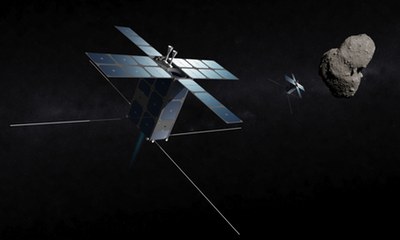Bringing space resources into the human economyby Greg Anderson
|
| A key component in such a legal structure would be an institution that translates the potential wealth in the natural resources of asteroids into value that can be accepted and used in the human economy. |
One approach calls for companies wanting to mine asteroids to simply stake their claims, as miners always have, and go from there, in effect daring governments to stop them. That might work, but extraordinary amounts of money will likely be involved. The controllers of those vast resources will also wield immense power. Politicians will impose controls on those companies. Those controls can either be worked out early on and guide development, or they can be established later on, when the situation is more complex. The better option would be to build legal structures early that will lay a foundation upon which private concerns can confidently and profitably operate in space, while also using the new resources to underpin a transformation of human society to meet the great challenges that lie ahead.
A key component in such a legal structure would be an institution that translates the potential wealth in the natural resources of asteroids into value that can be accepted and used in the human economy. Banks have generally filled such roles in other industries. Gold and other assets owned by a bank were used to support the value of that bank’s notes, which could then be used as a currency. Central banks today often try to manipulate the value of national currencies by buying and selling financial instruments—and, sometimes, gold itself. A bank chartered to turn the value discovered in asteroids into wealth could use similar approaches while also supporting the growth and development of the economy. Bonds backed by the assayed wealth of specific asteroids—physical assets directly tied to bonds—could underwrite specific space industrialization projects, and such support could then attract investment capital from other areas (see “The asteroid mining bank”, The Space Review, January 28, 2013).
Both historically and currently, municipalities and other governmental units use bonds to fund infrastructure projects, and corporations use bonds for long-term projects and to retire debt. Building the infrastructure of an economy in space will require long-term financing. Constructing private space stations to serve as research labs, factories, and hotels will require years of work before profits begin to flow. Establishing an industrial base for a lunar economy will take even longer, though that is the key to truly moving into space. The ultimate solution to Earth’s energy needs—and a big part of the solution to the problems of pollution and climate change—is space-based solar power. The energy produced by such a system will be clean, safe from natural disaster or human attack, and inexhaustible. Funding such projects with bonds issued by an asteroid mining bank that could back the value of the bonds with natural resources from designated asteroids could fuel a huge expansion of the human economy.
| If asteroid resources cannot legally be used in commerce because the concept of property rights is only vaguely established in space law, a capitalist economy in space can’t develop. |
Such an expansion could come at precisely the right time, too. Climate change threatens to disrupt civilization by destroying traditional agricultural patterns, flooding coastal cities, and weakening leading nations and the basic social fabric. If debt-ridden governments have to deal with those issues in an already struggling economy, the results could be grim. A robust, expanding, wealthy economy, on the other hand, would give leaders more, better, and more creative options. Democracy and other great achievements of human civilization might survive. The best of the human spirit—the ability to cope, and even prosper, while trying to understand our place in the universe, regardless of circumstance—might endure.
The second charge in the charter of an asteroid mining bank should be to encourage and support international development projects, again deploying wealth from space. In so doing, the bank could increase political support for itself, bring people to the democratic side by showing them their lives can become materially better fairly quickly if they work and make good decisions, and, most importantly, support massive international development that could bring the vast bulk of humanity into an optimistic twenty-first century, with humanity poised to make the inner solar system the home of a multiplanetary civilization.
All the above, of course, is dependent open establishing the precise legal status of asteroid resources. If they cannot legally be used in commerce because the concept of property rights is only vaguely established in space law, a capitalist economy in space can’t develop.
